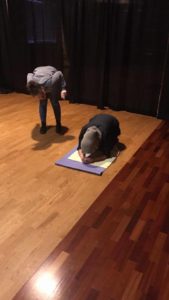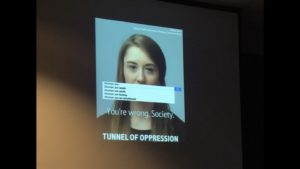
Student performers acting out discrimination against religion, Feb. 8, 2017. Photo by Amber Degree.
The ‘Tunnel of Oppression’ returned to WCU Thursday, Feb. 8, in the University Center for a two-day event. Students lined up talking amongst themselves and eager to go in to the tunnel, but upon leaving, their faces had no expressions and there was no talking.
The event is hosted by students and the Department of Intercultural Affairs to inform community members about the types of oppression around the globe and on campus.
Students perform the different types of oppression such as, human trafficking, homosexuality discrimination, and stereotypes. Each room, dimly lit, in order to portray the ‘tunnel’ effect and to give the audience the illusion of fear and uneasiness. The skits, though short, were powerful. The voices, of the student actors, rang heavy and loud throughout the hollow tunnel.
Graduate internship coordinator with Intercultural Affairs, Dean Paulk, says the event is a great eye-opener for students.
“It is a good way to expose students to things that they may not experience in their daily lives such as discrimination, hatred or oppression,” said Paulk.
Participants get the opportunity to walk through each room and observe each scenario.

Presentation from “Tunnel of Oppression.” Photo by Amber Degree.
There are five different scenarios of oppression. Each scenario is either set with props or video presentation equipment.
Member of the Inspirational Gospel Choir and performer in the Tunnel of Oppression, Maya Hall, said she hopes her role allows people to better understand oppression.
“I wanted to let the audience feel what we are portraying when they stepped into the room. I want them to feel how girls who are trafficked feel,” Hall said.
In 2016, over 100 students participated, which made it hard for big crowds to get the full effect. To avoid overcrowding this year, only 10 participants were allowed to go in at a time.
“It was pretty popular and packed last year, so we decided to extend it to two days this year. Like 20 students going in at a time and it was just too much. The people in the back couldn’t see as well because there were just so many people going in at one time,” said Paulk.
Student, Madison Dye, who went through the Tunnel said a part of the event will always stay with her.
“When I entered the domestic violence room and heard the little girl crying and screaming, it made me feel so terrible. It felt so real. I’ll never forget hearing it,” she said.
Intercultural Affairs plans to sponsor the ‘Tunnel of Oppression’ again next year.


